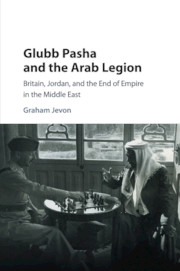Book contents
- Glubb Pasha and the Arab Legion
- Glubb Pasha and the Arab Legion
- Copyright page
- Contents
- Illustrations
- Acknowledgements
- A Note on Transliteration
- Abbreviations
- Introduction
- 1 The 1946 Treaty, Palestine, and the Preclusion of the Arab Legion’s Planned Post-War Disbandment
- 2 The Partition of Palestine, the Greater Transjordan Solution, and the Newfound Significance of Glubb Pasha and the Arab Legion
- 3 The 1948 War and Glubb’s Management of the Greater Transjordan Scheme
- 4 Bringing the 1948 War to an End: The Ad Hoc Consolidation of Greater Transjordan
- 5 Beyond 1948: The Arab Legion, Arab Nationalism, and the Cold War
- 6 A Puppeteer in Search of a Puppet: The Royal Succession and Britain’s Policy of Selective Non-Intervention
- 7 The Glubb Paradox and King Hussein’s Quest for Control of the Arab Legion
- 8 Behind the Veil of Suez: Glubbless Jordan and the Termination of the Treaty
- Conclusion
- Bibliography
- Index
2 - The Partition of Palestine, the Greater Transjordan Solution, and the Newfound Significance of Glubb Pasha and the Arab Legion
Published online by Cambridge University Press: 04 May 2017
- Glubb Pasha and the Arab Legion
- Glubb Pasha and the Arab Legion
- Copyright page
- Contents
- Illustrations
- Acknowledgements
- A Note on Transliteration
- Abbreviations
- Introduction
- 1 The 1946 Treaty, Palestine, and the Preclusion of the Arab Legion’s Planned Post-War Disbandment
- 2 The Partition of Palestine, the Greater Transjordan Solution, and the Newfound Significance of Glubb Pasha and the Arab Legion
- 3 The 1948 War and Glubb’s Management of the Greater Transjordan Scheme
- 4 Bringing the 1948 War to an End: The Ad Hoc Consolidation of Greater Transjordan
- 5 Beyond 1948: The Arab Legion, Arab Nationalism, and the Cold War
- 6 A Puppeteer in Search of a Puppet: The Royal Succession and Britain’s Policy of Selective Non-Intervention
- 7 The Glubb Paradox and King Hussein’s Quest for Control of the Arab Legion
- 8 Behind the Veil of Suez: Glubbless Jordan and the Termination of the Treaty
- Conclusion
- Bibliography
- Index
Summary
- Type
- Chapter
- Information
- Glubb Pasha and the Arab LegionBritain, Jordan and the End of Empire in the Middle East, pp. 54 - 88Publisher: Cambridge University PressPrint publication year: 2017



